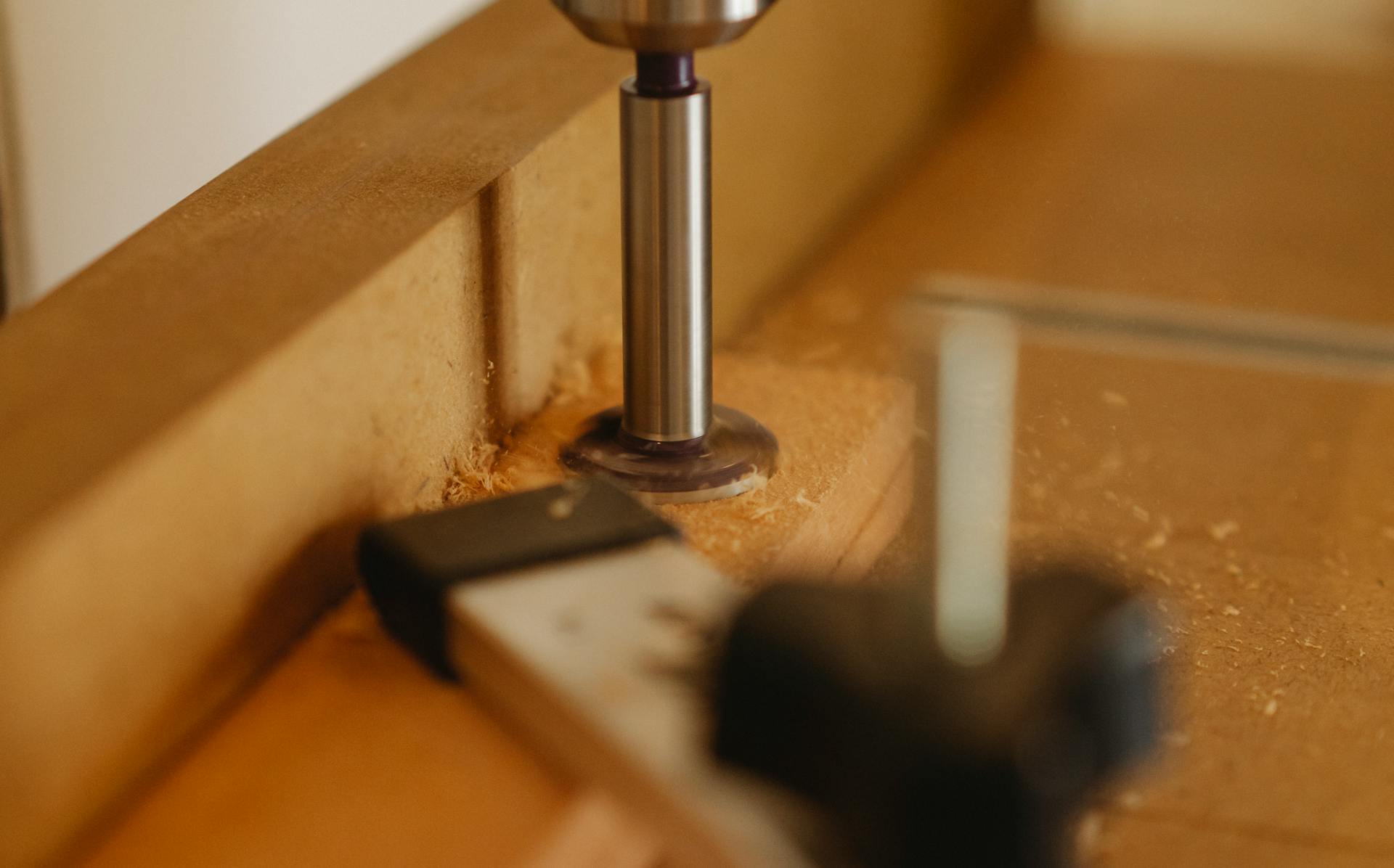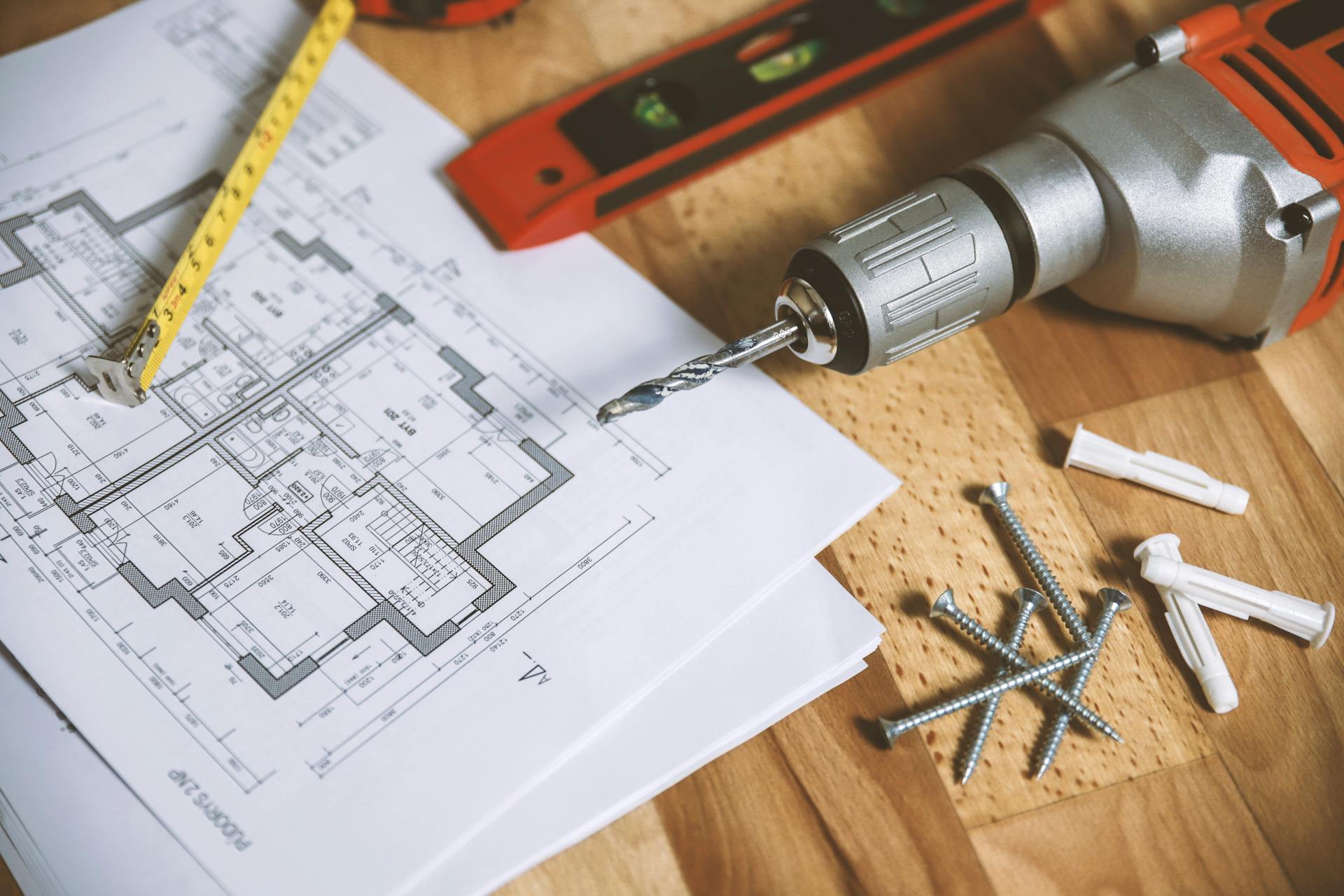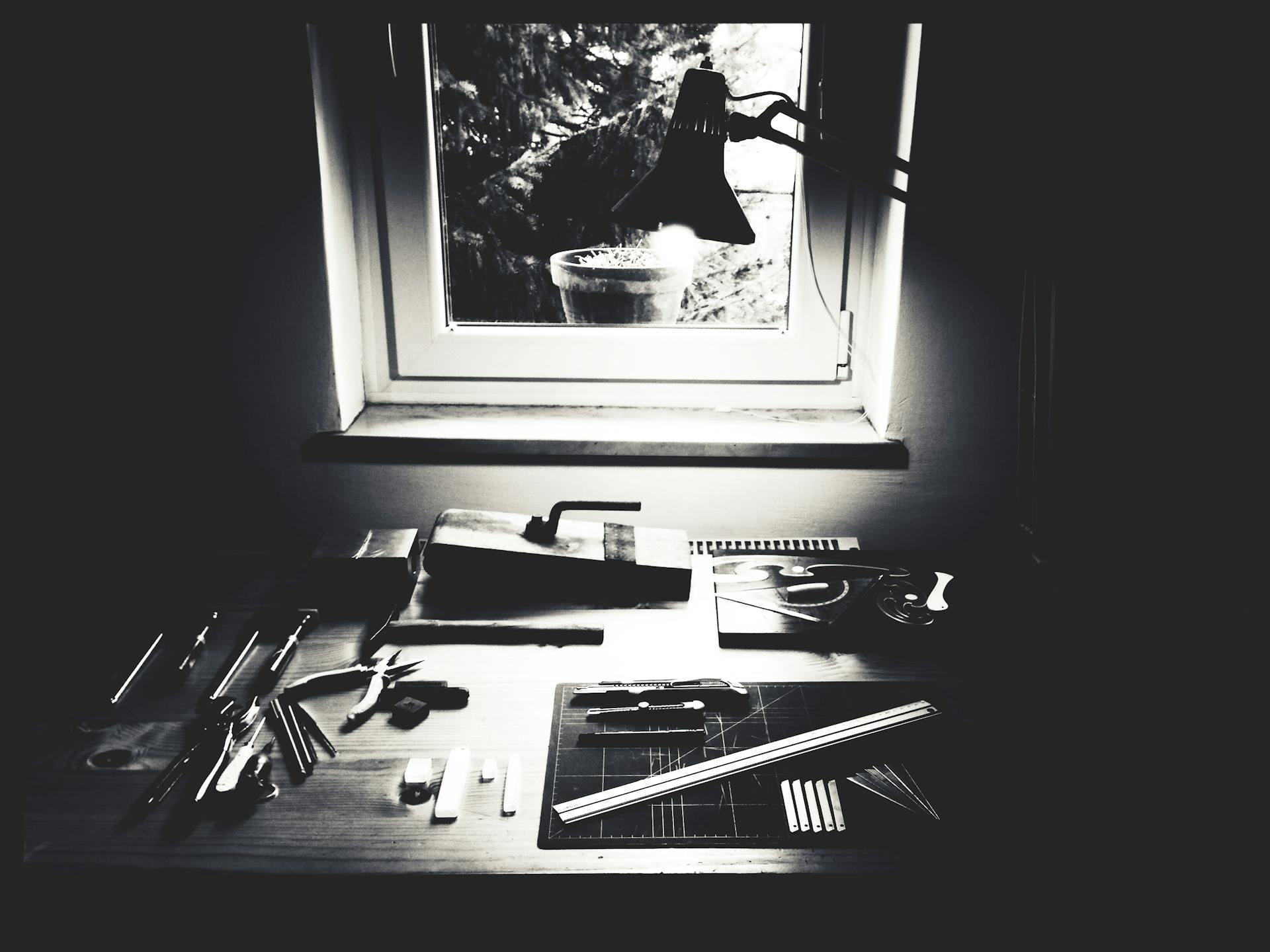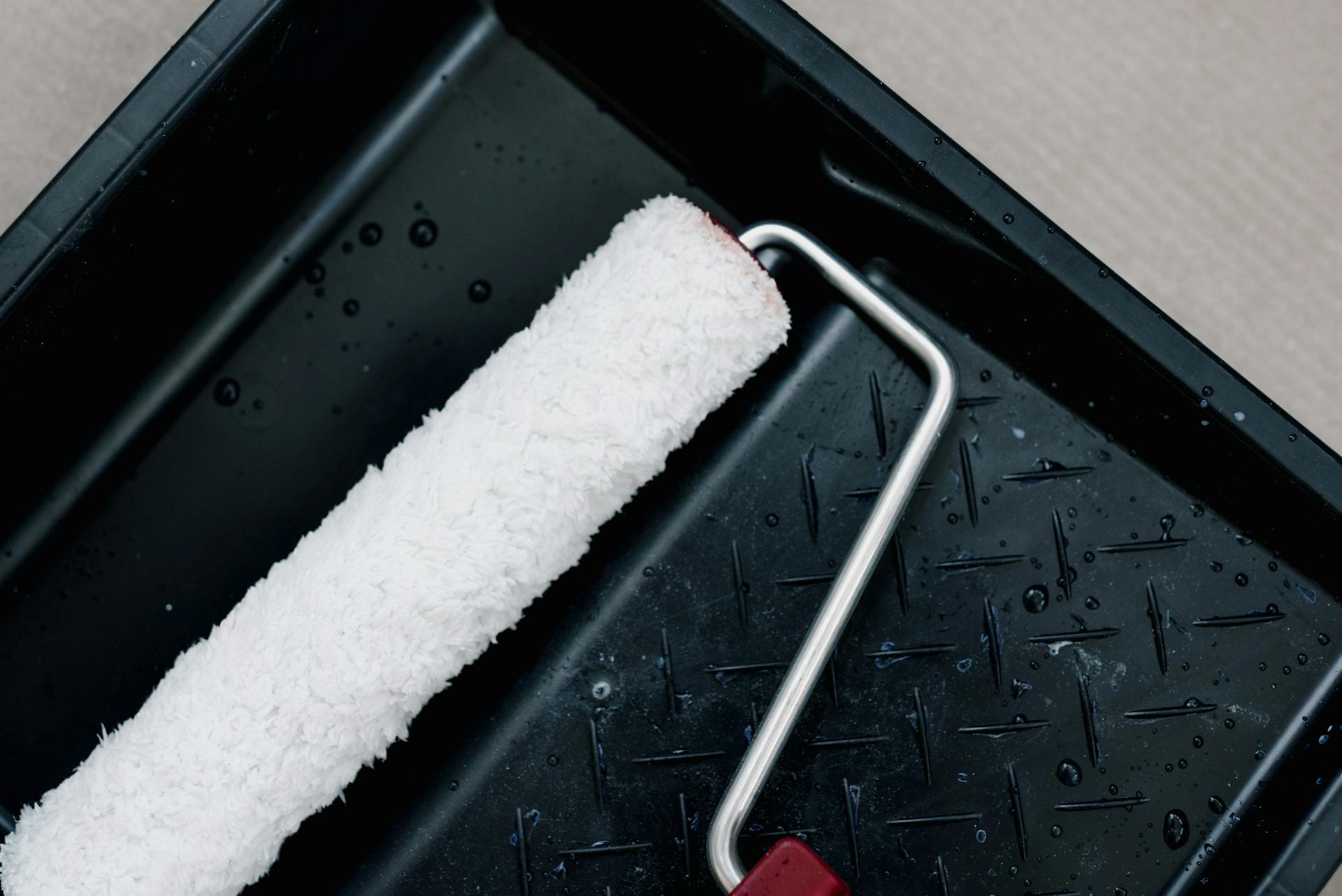
Drill bits are essential tools that have been used for centuries to bore holes in various materials. They come in different shapes and sizes to suit specific drilling needs, and each type is designed for a particular application. Understanding the different types of drill bits and their uses can make a significant difference in the success of any drilling project.
Whether you're a DIY enthusiast or a professional contractor, choosing the right drill bit is crucial to achieving your desired results. From masonry to wood and metal, there's a range of drill bits available to suit different materials. However, with so many options available, it can be overwhelming to know which one to choose. In this article, we'll explore the various types of drill bits and their applications, providing you with valuable insights into unlocking the secrets behind each one.
If this caught your attention, see: Hammer Drill vs Impact Driver
Discover the Best Drill Bit Types for Your Next Project
The right drill bit can make or break your next project. As any avid DIYer recognizes, the wrong bit can damage your work material, create imprecise holes, and waste time and money. That's why it's essential to spend hours researching the best drill bits for your specific needs.
When it comes to selecting the perfect drill bit type, it's crucial to consider the work material you'll be drilling into. For soft materials like wood or plastic, a twist drill bit will do just fine. However, for harder surfaces such as metal or concrete, you'll want a specialized carbide-tipped drill bit that can handle the job with peak efficiency.
Overall, there are dozens of different types of drill bits available on the market today. From spade bits to hole saws to countersink bits and more, each type functions differently and is designed for specific tasks. By doing your research and selecting the right drill bit for your project, you can ensure a successful outcome every time.
Discovering the Marvel of Drill Bits: A Comprehensive Guide
When it comes to DIY projects, one essential tool that you can't do without is the drill bit. It is a rotary cutting tool that makes holes in various materials such as wood, metal, and plastic. The drill bit contacts the material you're drilling and removes it, creating a hole of the desired size.
If you've ever wandered down an entire aisle of drill bits at a hardware store, you know how overwhelming it can be to choose the right one for your project. The good news is that selecting the correct drill bit doesn't have to be difficult. Before heading out to buy one, consider the type of material you'll be drilling into and make sure you have a compatible drill chuck size. With these factors in mind, you'll be able to find the ideal drill bit for your DIY projects in no time!
Recommended read: Best Diy Painting Tools
How an Installer Drill Bit Can Save You Time and Frustration

If you're someone who frequently works with installing wiring, you know how important it is to have the right tools. One tool that can save you a lot of time and frustration is the installer drill bit. Designed specifically for cable installation professionals, electricians, security system technicians, and other wiring installer bits, these bits are designed to make your job easier.
Installer drill bits typically come in lengths of up to 18 inches, allowing you to drill through wood, plaster, and light masonry materials without having to switch out your bit. This length also allows you to reach deeper into walls or floors when necessary. And because these bits are designed for specific applications, they can help ensure that you're drilling the right size hole in the target material every time.
Once you've drilled your hole using an installer drill bit, you'll notice another advantage: the bit back is often shorter than standard drill bits. This means that the hole attach point is closer to the tip of the bit than it would be with a traditional bit. This makes it easier to accurately place screws or anchors in the hole without accidentally hitting nearby wires or other obstacles. So if you want to save time and reduce frustration next time you're installing wiring, consider investing in an installer drill bit!
Upgrade Your Woodworking Game with the Forstner Drill Bit

If you're serious about woodworking, then you need to invest in a quality set of forstner drill bits. These specialized bits are designed for creating clean holes with flat bottoms, making them perfect for building projects that require precision and accuracy. Whether you're working with hardwoods, softwoods, or laminates, forstner drill bits are the way to go.
One of the biggest advantages of using forstner drill bits is their ability to create flat-bottomed holes. This means that your screws or other fasteners will sit flush with the surface of your project, creating a more professional-looking finish. Additionally, the flat base works well when drilling into end-grain wood or angled surfaces. While handheld drills can be used with forstner bits, they work best when used in a drill press.
Forstner drill bits come in a variety of sizes and shapes, allowing you to create holes of different depths and diameters. They also have a sharp cutting edge that stays sharp longer than other types of drill bits, reducing the amount of time you spend sharpening your tools. So if you want to take your woodworking game to the next level, investing in a set of forstner drill bits is definitely worth it!
Discovering the Applications of Drill Bits
Drill bits are tools that are designed to bore holes into a variety of materials. They come in many shapes and sizes, and can be used for a wide range of tasks. Common materials that can be drilled with drill bits include wood, metal, plastic, ceramic tile, porcelain, concrete and more.
Concrete drill bits are made from tough materials that can withstand the extreme heat and pressure generated when drilling through this dense material. Steel, aluminum, copper, cast iron, sheet metal, fiberglass, brick and vinyl flooring are just some of the other materials that can be drilled using specific diameter drill bits. Depending on the task at hand and the type of material being drilled, different types of drill bits may be required to achieve optimal results. So whether you're a professional contractor or a DIY enthusiast looking to tackle a home improvement project, having the right drill bit for the job is essential!
Discover the Various Physical Shapes of Drill Bit Types
The physical shape of a drill bit is the easiest factor to identify when selecting the right one for your project. There are many different types of drill bits available, each with a unique shape designed for specific drilling tasks. Some common shapes include twist, spade, auger, and hole saws. By understanding the physical shape of each drill bit type, you can make a more informed decision about which one will work best for your needs.
Unleash the Power of the Ultimate Screwdriver Drill Bit!
Screwdriver drill bits are a must-have for anyone who frequently undertakes building projects renovations or machine work. These versatile tools come in a range of materials depending on their intended use, with each material offering its own set of benefits. The most common materials used for screwdriver drill bits are high-speed steel, cobalt steel, and titanium-coated steel.
Another important factor to consider when selecting screwdriver drill bits is the tip type. Different tip types are designed for specific tasks like drilling into metal, wood, or plastic. It’s essential to choose the right tip type to prevent damage to your materials and ensure that you get the job done efficiently.
Whether you’re using handheld drills or impact drivers, depending on your project requirements, having a reliable set of screwdriver drill bits can make all the difference. With their versatility and power, these small but mighty tools are sure to be an asset for any DIY enthusiast or professional tradesperson looking to take their craft to new heights. So why not unleash the power of the ultimate screwdriver drill bit today?
Unravel the Magic of a Twist Drill Bit!
Twist drill bits are essential tools that aid in general-purpose rotary drilling. These versatile drill bits are perfect for use in light metal, wood, plastic, and ceramic materials. They are commonly used in home repairs, maintenance, and building projects.
One of the unique features of twist drill bits is their spiral flutes that help to remove debris from the hole as it is drilled. The sharp edges of the bit also make it possible to cut through materials such as metal and wood with ease. Their design allows them to create holes quickly and efficiently.
While there are many types of drill bits available in the market, twist drill bits remain a popular choice due to their versatility and ability to work on multiple surfaces. They have become one of the most common drill bits used by professionals and DIY enthusiasts alike. So next time you need to make a hole in a material, consider using a twist drill bit for efficient results!
Discover the Versatile Tool: The Brad-Point Drill Bit!
Are you tired of drilling crooked and uneven holes? Look no further than the brad-point drill bit! The main feature of this type of drill bit is the brad located at the tip, which helps to guide the bit for boring precise holes. Unlike traditional drill bits, the brad-point bit removes material more efficiently, resulting in cleaner and more accurate holes.
The extra wide grooves on brad-point bits also help to remove excess material and prevent clogging, allowing for a clean exit point. Whether you're installing cabinet hardware or boring accurate holes for woodworking projects, brad-point bits are a must-have in any tool collection. With rubber stoppers allowing for drilling to desired depth, these versatile bits can tackle a variety of tasks with ease.
In conclusion, if you want to make sure that your next project has perfect holes every time, invest in a set of brad-point bits. These tools are ideal for anyone who needs to bore precise and clean holes without worrying about damaging their workpiece. So why settle for less when you can have accuracy and efficiency with each use? Try out the brad-point drill bit today and see the difference it can make in your woodworking or DIY projects!
Frequently Asked Questions
What is the most common type of drill bit used?
The most common type of drill bit used is the twist bit. It is versatile and can be used on a variety of materials including wood, plastic, and metal.
What are the best drill bits made of?
The best drill bits are typically made of high-speed steel (HSS) or cobalt. These materials provide durability and strength for drilling through a variety of surfaces.
What are the different drill bits?
There are several types of drill bits, including twist bits, spade bits, auger bits, forstner bits, and hole saws. Each type is designed for specific drilling tasks and materials.
What are all the different types of drill bits?
There are several types of drill bits, including twist, brad point, spade, forstner, masonry, and hole saw. Each type is designed to handle specific materials and drilling tasks.
What kind of drill bit should I use?
The type of drill bit to use depends on the material you are drilling into. For wood, use a brad point bit; for metal, use a twist bit; and for masonry, use a masonry bit. Make sure to choose the correct size for your project.
Featured Images: pexels.com


